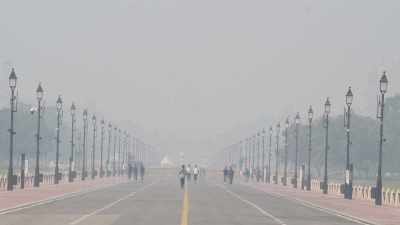Talk to these women to know the wages of widowhood
VRINDAVAN, FEBRUARY 5: The 3 o'clock silence of the afternoon is broken by the most unlikely of people: the widows of Vrindavan (popularly...

VRINDAVAN, FEBRUARY 5: The 3 o’clock silence of the afternoon is broken by the most unlikely of people: the widows of Vrindavan (popularly called mai) have congregated in the temple town’s scattered ashrams for the day’s final bhajan session. In the marbled, main hall of the Balaji Bhajan Ashram, about 800 women cling to each other in neat rows as they chant Radhe Shyam and Hare Krishna to the whimsical commands of their dashi (leader).
Outside, the greying but stocky Chailbehari Phatekurtawala, the ashram’s panda (caretaker-cum-family recorder), goes through his daily routine of changing and counting stacks of 10-rupee notes which are to be distributed later while his assistants drag a couple of sacks of rice and dal to the main gate. After two hours of bhajans, the appointed dashis take up their positions with a military air. Instructions to leave from the backdoor and file in an orderly line are violated as women scurry out through the crack of the main door, forcing the dashi to lean heavily against itand finally bolt it.
Wrapped in yellowing cotton saris, these elderly, frail, women carry the crushing weight of widowhood: years of deprivation, exploitation, poverty and hunger. Abandoned by sons and daughters, fathers and brothers, even husbands, they flock to Kashi and Mathura looking for shelter and solace. They arrive in trains and buses from Bengal, Assam, Tripura, Manipur, Nepal and Bangladesh following their “pandas & gurus” who bring them here.
As the controversy over Deepa Mehta’s unshot film continues, theirs is a story that will never get heard above the clamour of voices from both sides: the filmmaker citing her art, the protester quoting tradition with an equal passion. Says one of the women at the ashram: “Hundreds like you have come and met us to listen to our stories but can you get me my pension? Or give me more food? No…” she waves her hand.
There is a reason why many widows are here in Vrindavan which ties in with why many of them are from Bengal. Says Kamala Ghosh, activistand headmistress of the local Swami Vivekananda School: “The Bengali and Vrindavan are as inseparable as khoon and shareer. The Vaishno tradition has been strong in the east and this is the seat for Vaishnavites. So, it is not surprising they still believe that in Vrindavan you will not starve, for God will feed you.”
God has his own ways of looking after his flock: belief has ensured that the women earn a princely sum of Rs 2 twice a day for both bhajan sessions, plus 200 gms each of rice and dal after each session. Thunders Chailbihari when asked whether this is enough: “What more does she need to sustain herself? Can a person eat half a kilo of rice and dal everyday? Many of them work in households and earn money, sometimes in their panda’s ashram or temple. The mais also barter some of their rations for masalas. Then, during festivals, lalas arrive to distribute blankets, stoves, saris, which they also sell. It is good payment.”
Usharani Das (70) came 15 years ago in the footsteps of her guru,from Balishal in West Bengal, after she was widowed and abandoned by her family. Over time she saved money to go back and visit her family. It was not long before two of her sons followed her to set up home in Vrindavan. But they still won’t have her live with them to further shrink their dwindling resources. Today, Usharani breaks her back working in a Gujjar household, who are kind enough to let her live in a room for a rent less than the market rate.
Says Kamala Ghosh, shaking her head in wonder, “The mais know how bad the conditions are back home and despite the fact that they have been abandoned by their own children, they can’t help thinking of doing something for them. After all, even birds and animals feed their offspring first.”
In their daily struggle to survive, it doesn’t matter what the physical condition are. The Amarwadi Ashram, an 80-room living quarters, is dank and dark, with a clinging smell of decay and rot. Tears roll down as they remember their families, the only unbearable momentthey have, for they have steeled themselves to every other hardship.
And the list goes on and on. If it is not the tehsildar who refuses to fill their forms for pension, it’s the bank clerk who forges their signature, or the landlord who takes funeral expenses before renting out the room, or the priest or householder who has sexually exploited them and kept them as cheap labour. But that’s another story.
TOMORROW: How the town benefits from the widows.





- 01
- 02
- 03
- 04
- 05


























